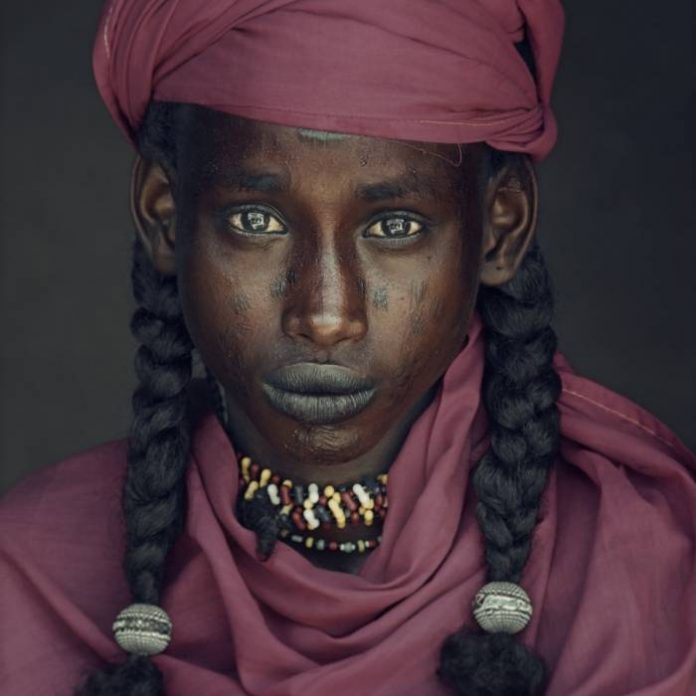At the end of September, just after the rainy season and before spreading out in small family bands into all four corners of the Sahel, clans of the nomadic Wodaabe tribe gather collectively to celebrate their traditional Gerewol Festival. It is a time to socialize, hold tribal meetings, baptize babies, barter over dowries, or help each other out if needed. But above all, it is an opportunity for the young to meet, date, mate, and marry.
The Wodaabe, also called the Mbororo (meaning: those who live in cattle camps), are a small subgroup of the larger Fulani ethnic group living in many parts of West and Central Africa, stretching from Senegal to The Sudan. They are nomadic cattle herders, always on the move in search of greener pastures, and usually not staying longer than a few days in one given place. They are particularly famous for their annual Gerewol Festival — an extravagant display of beauty contests and courtship rituals in which hypnotic chant and dance, and elaborate attire and make-up are the key ingredients for attracting the admiration and affection of potential love mates.
There is one major twist, though: the Gerewol contestants are, unlike in most other beauty pageants, young and handsome males, and their judges are young marriageable females — often still in their teens — who evaluate the men carefully on their charms, dancing skills, stamina, and appearance, before slowly zooming in on their most attractive pick. It may remain a playful flirtation, it may lead to a night of love, or it may turn into a serious marriage proposal. Whatever the outcome, there will not be any social stigma attached, since a young woman’s virginity is not a major concern of the Wodaabe.
Many Wodaabe girls and boys have already been pledged to each other in infancy by their parents, often to cousins, to preserve the traditions to which they fiercely hold on. Among the polygamous Wodaabe it is fairly common to temporarily hook up with someone else, or marry more than once, twice, or even three times. Also, since beauty is highly valued in their culture, a married man who is not particularly handsome may encourage his wife to sleep with a more handsome man in the hope she will bear a beautiful child.
The Festival Location
It is September 2017, and I am in the Republic of Chad, in the company of a small group of adventure travelers, eager to attend a truly authentic Gerewol Festival. Whereas the Gerewols in neighboring Niger have already grown into spectacles largely infiltrated by commerce and tourism, we have been told that few foreigners have ventured yet into the remote parts of the Chadian Sahel.
After traveling for a few hundred kilometers east of N’Djamena, Chad’s capital, our 4x4s veer from the main road into the brousse (bush) of the Sahel, the semi-arid belt on the southern fringe of the Sahara desert. First, we pass small settlements inhabited by tribes such as the Hausa and Fulani, scattered around water sources, but soon we are only surrounded by bush and savanna.
As the location of the festival is always kept secret until the last moment, we are accompanied by a turbaned Wodaabe “informant,” who knows where the festivities will take place and can guide us to our end destination: a large open space bordered by thorny shrubs and acacia trees, where various Wodaabe families have already set up camp.
Before long, more clans arrive, with their small kids and lambs — too young to walk — piled up on donkeys and seated amidst their household effects: poles, blankets, and mats for their simple “homes,” and beautifully decorated calabashes — the status symbols of the Wodaabe women. The men follow on their horses, keeping together their vast herds of goats, sheep, and zebus.
Soon after our arrival, we have an official meeting with a council of Wodaabe elders, seated with their iconic Sahelian tea set on mats rolled out under a big acacia tree to dodge the sweltering sun. Our local guide asks permission to camp near their “houses,” mingle with tribe members and attend the ceremonies. The chief solemnly welcomes us in his own language, Fulfulde, while the other elders are nodding in agreement. One of them speaks French and explains that they feel greatly honored by our presence, especially considering the long distances we have traveled to learn about their way of life. He also confirms that we are the only outsiders invited to this intimate tribal festival.
The Wuros and their Inhabitants
For the next few days, our mornings are spent meeting the always welcoming and friendly women and children around their small camps or wuros, where each family has marked their own space with a large wooden bed constructed from brightly painted poles, and adorned with numerous small mirrors and beautifully carved gourds. The latter are hardly ever used, but rather passed on from generation to generation, and considered the pride of each Wodaabe woman.
The animals are grazing around the wooden structures, which are cordoned off by a calf rope, not only meant to indicate territory, but also to prevent the goats, tied to the rope, from roaming too far away. Stepping on the calf rope is taboo, since doing so may cause misfortune to strike, according to Wodaabe beliefs.
Although the tribe follows Muslim rituals and prayers, many of their old beliefs and customs are still preserved. For instance, men and women never sit on a mat together, and they also eat separately. In fact, despite their liberal views on sexuality, the rules about showing love are pretty strict: whereas affection in male or female friendships can be openly demonstrated, men and women never talk, look each other in the eye, or show tender feelings for each other during daylight. That reserve and avoidance also spills over in parents’ relationships with first-born children, who are traditionally raised by extended family members..
Milk is the main staple of the Wodaabe’s diet, supplemented by millet, which has a higher caloric value. Tomatoes, corn, and sorghum are occasionally traded for their artisan products at local markets.
Horned and humped cows, or zebus, are considered the Wodaabe’s most prized possessions. Rarely are they slaughtered, except on very special occasions. On the contrary, they are treated like the owners’ pets, and each zebu carries its own name. Sheep and goats provide milk too, and they also serve ceremonial purposes, as is the case in other Islamic communities. Donkeys are used for transportation.
Grooming and Make-Up Seances
In the afternoons, small clusters of young, tall, and slim Wodaabe men, dressed in colorful outfits over their leather loincloth, and each equipped with a make-up kit, are formed under the larger trees — the branches used as hooks for the men’s belongings.
With the help of a little hand mirror, they spend hours applying make-up to highlight valued facial features such as symmetry, a long sharp nose, white teeth, a round face, and big eyes. Meanwhile, their hair is plaited in small strands by female clan members (mothers, sisters, and sometimes wives).
The men paint their faces yellow (color of joy and happiness) or red (color of power and strength, important themes in their warrior dances) with clay and extracts from desert plants, and add dotted patterns on their cheeks, chins, and foreheads. Then they carefully contour their eyes with black powder they scoop out of old batteries and color their lips black or blue for contrast with their teeth. Camaraderie is important: they always assist each other with putting outfits and headdresses together or applying the finishing touches.
Exquisite jewelry made from leather, brass, or copper, and beaded headdresses or turbans, with a large feather stuck into them, complete their colorful attire. The feather serves, in fact, to imitate the long-legged white cattle egret, an elegant bird that grows long plumes from its back in the early breeding season. In the egrets’ courtship rituals the males are indeed performing most of the displays.


























